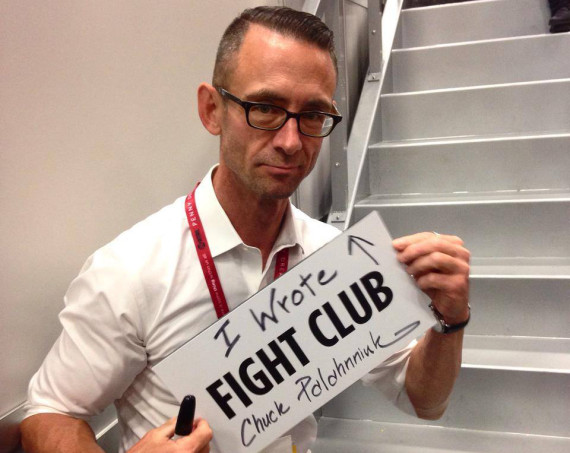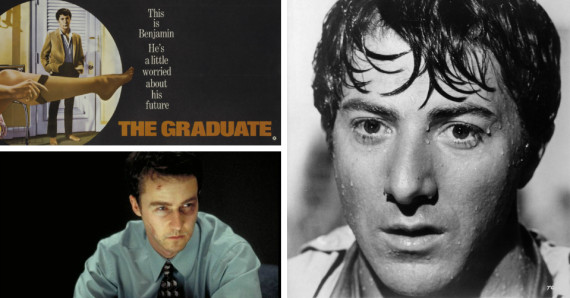
If you're a super fan who does not talk about "Fight Club," you might as well read about it.
You probably already know that there's a Starbucks cup in almost every scene, Tyler Durden had a split second FBI warning parody and that author Chuck Palahniuk prefers the movie to his own book. But we went deep into forgotten interviews and profiles, pulling words right from the cast, crew and writers, to find those trivia facts you truly did not know about the movie "Fight Club."

In an interview with The Yale Herald in 1999, Edward Norton explained the two different transformations of Tyler Durden and his Narrator character:
We decided together that I was going to get very thin. It's almost a junkie metaphor. This guy is an unreliable narrator in the sense that he's saying "you became carved out of wood and you felt powerful" and yet his body's disintegrating and he's bruised and shattered. And Brad made the decision to go the opposite way because Tyler is the way my character sees himself. Brad got progressively bigger throughout the movie, he bulked up and got huge and tan and beautiful while I became Gollum.
According to Norton, the Narrator was also based off of Holden Caulfield. As Norton told Interview magazine in 1999: "We tried to set up a mournful, almost Holden Caulfield-like inner narrative in the film as my character talks about his life of travel and hotel rooms with mouthwash and toothbrushes and single servings and mini-everythings."

Chuck Palahniuk told Premiere Magazine in 1999 that people would come up to him at book signings and beg him to tell them of real locations for fight clubs. Palahniuk remarked, "You'd be really surprised at the number of women."
As the interview notes, although Palahniuk had heard rumors of actual fight clubs existing in places such as New Jersey and London, the author wouldn't give these hopefuls any useful information. Palahniuk explained, "I'll be like, 'No, it's made up; it's fake.' It just breaks people's hearts."

Visual effects supervisor Kevin Haug gave a special commentary about the movie's sex sequence where he talked about how CGI was used to create the action. Haug remembered director David Fincher explaining one position: "I think David said it was as though one of the statues from Mt. Rushmore was fucking the Statue of Liberty." In this commentary, Haug also recalled Brad Pitt's intended approach for researching the mechanics of his acting in the scene:
I remember Brad coming in at one point and saying he wanted to see a pile of pornography so he could pick positions out of that. But basically, pornography was boring in terms of like, different positions. They're all the same positions. We actually pulled positions out of the Kama Sutra.
The other actor in the sex scene, Helena Bonham Carter, said that filming all the positions really wasn't as sexy as it appeared on camera. Marla's breasts in the film are even just CGI. Her original 1999 interview with The Mirror seems to be lost, but at the time Salon aggregated a quote by Carter from the interview where she said: "Brad had white dots all over his body ... On the count of three we had to, ah, orgasm." As an ESPN article from 2003 recounts, Carter is quoted on the DVD commentary saying:
I spent so many days coming in and basically doing voice-off orgasm sounds on this film. The first time was a bit embarrassing, but I got used to it. And David [Fincher] would say, 'And roll. And Edward: Act. And Helena: Orgasm.' It can make you quite dizzy, because you can tend to hyperventilate. But I think I got that technique down. That was one major thing I learned on this film: faking orgasms repeatedly.
In the interview with Premiere magazine, Edward Norton and Brad Pitt joked about the various fighting they had to do onscreen and how sometimes the moves couldn't really be faked. Norton specifically recalled, "I cracked my thumb on Brad one time, on his stomach."
The author of the Premiere article, Johanna Schneller, wrote as an aside: "(This is too good to be true. Have you seen Pitt's stomach?)"
Further in this discussion about fighting, Norton recalled, "We both caught knees in the chest. Cracked ribs. Just had the wind knocked out." To this, Pitt responded, "That's how cool we are."

Auntie Godmother's is a Californian boutique soap company that was founded in 1995. Founder Cheryle-Anne Townsend, who goes by Auntie Godmother, taught both Edward Norton and Brad Pitt how to make soap for their roles.
On a Facebook post about a farmer market back in 2010, Townsend commented about her business, "We are professional soap makers and made all the soaps for the movie 'Fight Club.' They actually discovered us at a farmer's market!"

Johanna Schneller wrote in the Premiere profile about the Tyler from the real world: "'Tyler' is a carpenter with a penchant for trespassing; he leads forays into condemned buildings to salvage marble and fixtures."
Palahniuk is quoted as saying that his friend Tyler is "one of those neo-romantic people who think if the Y2K bug happens, we'll all be better off."
The friend that provided inspiration for Marla apparently had a wish back before Palahniuk was an acclaimed author, that if he ever got famous then he'd take her to meet Brad Pitt. Years later, Brad Pitt was cast in this movie and Palahniuk was able to bring all six of his friends that inspired characters to the set. He recalled, "So I was able to say, 'Tyler, this is Tyler'; 'Marla, this is Marla,' and everyone was really fascinated by one another."
In a 2014 interview with TOR, Palahniuk further described what his friends Tyler and Marla look like in real life while explaining the basis for "new looks" the characters will have in the forthcoming sequel. Tyler apparently has "shoulder-length-Jesus blond hair" and Marla isn't "very much like Helena Bonham Carter's character."

David Fincher gave an in depth description to Film Comment in 1999, about what inspirations went into creating the "Fight Club" look, most of which involved making things dirtier. One popular convenience store was specifically named by the director:
We didn't want to be afraid of color, we wanted to control the color palette. You go into 7-Eleven in the middle of the night and there's all that green-fluorescent. And like what green light does to cellophane packages, we wanted to make people sort of shiny.

As a 2000 profile in Cinefex recounts, Blue Sky Studios did CGI for the movie and since they were formerly associated with a company called VIFX that worked on "Titanic," Blue Sky had a "library of generic breath elements created for 'Titanic'" at their disposal. It is unclear whether Leonardo DiCaprio's breath is exactly what was used in the ice cave scene.
That said, this Cinefex article did explicitly say "existing breath elements" from "Titanic" were used in "Fight Club" however and digital artist John Siczewicz is quoted as saying:
After starting with those existing breath elements [from "Titanic"] we cut and pasted and dissolved until we had some animated breath that worked with the wind action within this ice tunnel. Since either the camera or the actor was in motion for all of these shots, I had to track in the origin point for each breath. Once these swirly breaths blended in, the whole scene dropped sixty degrees.

In a 1999 interview with Film Comment, David Fincher explained how his movie relates to the pursuit of Mrs. Robinson:
"The Graduate" is a good parallel. It was talking about that moment in time when you have this world of possibilities, all these expectations, and you don't know who it is you're supposed to be. And you choose this one path, Mrs. Robinson, and it turns out to be bleak, but it's part of your initiation, your trial by fire. And then, by choosing the wrong path, you find your way onto the right path, but you've created this mess. "Fight Club" is the '90s inverse of that: a guy who does not have a world a possibilities in front of him, he had no possibilities, he literally cannot imagine a way to change his life.
Edward Norton also mentions the relationship of "Fight Club" and "The Graduate" in the DVD commentary, saying, "It’s the story of youthful dislocation and of the feeling of entering the adult world and feeling out of sync with the value system that you’re expected to engage in and trying to figure out the answer to the question of how to be happy."

In a Premiere profile from 1999, Norton talks about how he thinks his character's trajectory is grounded in Buddhism:
In Buddhism there's Nirvana, and then there's Samsara, the world of confusion and disharmony. That world is our testing ground, where we have the experiences that help us become enlightened. I'm not saying "Fight Club" is The Book of Living and Dying, but it was kind of that idea: You're challenging yourself to break out of the world.
Also, within a Film Comment interview, David Fincher talks about how the Narrator's journey through the movie is Buddhist (although he doesn't know which Buddhist school of thought the philosophy comes from):
I don't know if it's Buddhism, but there's the idea that on the path to enlightenment you have to kill your parents, your god, and your teacher ... The movie introduces [Norton's character] at the point when he's killed off his parents and he realizes that they're wrong. But he's still caught up, trapped in this world he's created for himself. And then he meets Tyler Durden, and they fly in the face of God - they do all these things that they're not supposed to do, all the things that you do in your twenties when you're no longer being watched over by your parents, and end up being, in hindsight, very dangerous. And then finally, he has to kill off this teacher, Tyler Durden. So the movie is really about that process of maturing.
The idea of "killing mentors" is Linji Yixuan's Linji school of Chán Buddhism.

Johanna Schneller writes in her Premiere profile of the movie that when talking to Pitt and Norton, the two actively tried to avoid talking about "Fight Club." She explained, "They resist. Eventually they tell me that, yes, they're here to talk about 'Fight Club,' but they don't actually want to talk about it."
As an aside, Schneller wrote, "(Oh, I get it -- in the subversive spirit of 'Fight Club,' they've decided to deconstruct the magazine interview.)"
Eventually, after the two actors and her go back and forth for awhile about whether they should talk about "Fight Club," Pitt challenges Schneller, saying, "You tell us what ["Fight Club's"] about."

In her profile for Premiere, Johanna Schneller writes that the first time Norton fully smiles during the interview is when he starts recounting the ridiculous simplification him and Pitt would use to describe "Fight Club." As the actor sat up in his chair and affected a "glib, oily voice," Norton began saying, "For a while we were describing it as a story about two friends who start an amateur boxing club for disadvantaged young men ..."
At this point, Brad Pitt jumped in and finished Norton's description saying, "... and the woman who comes between them." Pitt continued, "Which is the best explanation I've heard."
Related
Before You Go






















